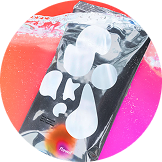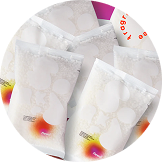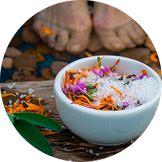It seems stress is everywhere these days - work, relationships, even just the thought of what you’re going to prepare for dinner or how you’re going to find time for the gym is enough to send you down a stress spiral.
Left unchecked stress can create chaos, affecting both your physical and mental wellbeing and preventing you from living life to the fullest. Chronic stress has concerning links to a myriad of diseases. The point being, you need to find healthy ways to cope with stress.
Could the answer be as simple as finding the best magnesium for stress? This vital mineral plays a role in hundreds of bodily functions, including your stress response. Unfortunately, the vast majority of people are deficient in it - it’s no wonder everyone is so high-strung!
Not all forms are created equal, though. We’ve put together this guide on which magnesium is best for stress to help you make the most of all this nutrient has to offer.
While forms like magnesium glycinate and magnesium oxide are most common, magnesium chloride is the #1 choice from a bioavailability perspective. Further to that point, you need to take it transdermally rather than orally. That’s why our magnesium bath soak is your best bet.
It contains a swarm of other stress-busting nutrients as well, from zinc to l-carnitine, nootropics, and vitamins A, E, and more. All of these work in synergy to erase cortisol (the stress hormone) while boosting serotonin levels and dampening the impact of adrenaline.
So, try the best magnesium soak today and put stress on notice once and for all. Or, learn more about what type of magnesium is best for stress below.
The Link Between Magnesium and Mental Health
So, does magnesium help with stress? Absolutely. But the truth is, this is just the tip of the iceberg for this powerful, versatile mineral. It’s one of the most essential nutrients, and yet, so few people actually get enough magnesium in their daily intake.
Magnesium regulates neurotransmitters like serotonin and dopamine, both of which influence mood stability and emotional well-being. Without enough magnesium, the brain has a hard time maintaining the optimal stress response (along with a sea of other problems).
The mineral helps calm the nervous system by activating gamma-aminobutyric acid (GABA) receptors, which essentially reduces neuron excitability to create a sense of calm.
Unfortunately, it’s a vicious cycle - does stress deplete magnesium? Yep. So when you’re stressed (and need magnesium the most), you actually excrete more magnesium. Then, your stress response worsens. You can see why this is so problematic.
You’ll feel the effects of stress both physically and mentally. Can stress cause sore muscles? It sure can - along with fatigue, anxiety, and difficulty focusing. It will also affect your sleep quality since magnesium also regulates melatonin levels.
Don’t worry, though. The answer is as simple as incorporating more magnesium into your daily routine! In reality, though, it’s not quite as straightforward as you might think. Most people run to their local wellness store or search for magnesium supplements online.
The problem is, there are countless forms of magnesium out there - each tailored to different needs. Furthermore, magnesium doesn’t absorb well orally. We talk more about this in our guide on topical magnesium vs oral.
All that being said, which magnesium is best for stress?
Which Magnesium is Best for Stress?
All magnesium supports a better stress response to some degree, but some are far more effective than others. This is because of bioavailability - or how easily a substance can be absorbed and put to use by your body.
Unfortunately, the most common forms like magnesium oxide are notoriously low bioavailability. This means most of what gets consumed is excreted as waste. So, what type of magnesium is best for stress? Look no further than magnesium chloride, used in our stress relief bath soak.
Magnesium Chloride
Magnesium chloride has one of the highest absorption rates of all types of magnesium, especially when applied topically through bath soaks, lotions, or sprays. It penetrates the skin to deliver magnesium directly to the bloodstream.
Not only does this lead to better uptake and faster effects, but perhaps more importantly, it eliminates the side effects associated with magnesium passing through the digestive system.
Magnesium chloride has been shown to be particularly effective at calming the nervous system and relaxing tense muscles. That’s why you’ll see it used in the best bath soak for sore muscles.
Magnesium Glycinate
This unique form combines magnesium and glycine, an amino acid known for its calming properties. It’s gentle on the stomach and highly bioavailable, perfect for those prone to digestive issues.
Glycine also supports neurotransmitter function which may stabilize mood and reduce feelings of anxiety. It’s not quite as effective as magnesium chloride for stress support specifically, but does have potential - and can help with insomnia as well.
Magnesium Threonate
Magnesium threonate has a powerful ability to cross the blood-brain barrier, which is why it’s commonly used in supplements aimed at improving cognitive function and reducing stress-related brain fog.
It actively increases levels of magnesium in the brain to enhance memory, focus, and overall mental clarity while simultaneously calming an overactive mind. So if you feel that your stress manifests in mental fatigue or trouble concentrating, try magnesium threonate.
Magnesium Taurate
Similar to magnesium gylcinate, magnesium taurate pairs magnesium with the amino acid taurine - which supports cardiovascular health and calms the nervous system.
This dynamic duo regulates heart rhythm and reduces the physical symptoms of stress, such as a racing heartbeat or high blood pressure.
Other Forms Commonly Used to Combat Stress
Which magnesium is best for stress is definitely magnesium chloride, and each of the other three forms above has its place in the conversation as well.
However, we also recognize that there are other forms commonly used to combat stress. While these aren’t the “best” magnesium for stress, we do want to highlight forms you might encounter in stress support supplements.
Magnesium Malate
This type of magnesium features malic acid, a compound naturally found in fruits like apples. This form is particularly helpful for combating fatigue and supporting energy production.
While more commonly used for conditions like chronic fatigue syndrome or fibromyalgia, it may help individuals dealing with stress-induced exhaustion by replenishing energy levels. Just know its stress-relieving effects will be more mellow compared to something like magnesium chloride.
Magnesium Lactate
This milder option is also used in supplements, specifically those designed for sensitive stomachs. It’s well-absorbed and can support general magnesium needs, including stress relief.
However, like magnesium malate, its benefits are more subtle compared to forms like magnesium glycinate or chloride. It may reduce mild physical tension caused by stress, but its gentle nature comes at the cost of effectiveness.
Magnesium Sulfate
If you’ve ever tried using epsom salts in a hot bath for anxiety, it was magnesium sulfate you were using. It’s popular because it's cheap and easy to find, and works wonders on sore muscles and tension. This can help combat the physical symptoms of stress.
But, its absorption through the skin is less efficient than magnesium chloride, and prolonged use can irritate the skin or disrupt the body’s magnesium balance. We talk more about this in our comparison of epsom salt vs magnesium flakes.
All this being said, you came here to learn about which magnesium is best for stress. The short answer is magnesium chloride. There’s really no need to bother with other forms. But, how much magnesium is necessary to support a better stress response?
How Much Magnesium Do You Need to Support a Better Stress Response?
There’s no one-size-fits-all answer on how much magnesium to take for stress support. It’s going to depend on how depleted you currently are, your diet, and how much cortisol needs to be erased form the body. Here are the recommended daily allowances (RDA):
- Men: 400-420 mg per day
- Women: 310-320 mg per day (increases to 350-360 mg during pregnancy)
However, those dealing with chronic stress or anxiety are typically advised to up their dosage to as much as 500 mg per day - at least at first. Once you build up your body’s magnesium levels you can slowly taper down to a more conservative intake.
Just be aware that higher levels of oral magnesium intake (supplement or diet) are associated with side effects such as diarrhea, nausea, or low blood pressure.
This is what’s neat about transdermal intake - your body only absorbs what it needs! This approach also bypasses the digestive system altogether so there’s no need to worry.
As far as when to take the best magnesium for stress, it’s not nearly as important as you’ve been led to believe. What matters most is you’re consistently maintaining optimal magnesium intake.
That being said, taking magnesium at night is best for helping your body and mind wind down from a hectic day, easing you into a restful state for deep, restorative sleep.
Which Foods Contain the Best Magnesium for Stress?
So which magnesium is best for stress if oral supplements aren’t going to cut it? Turning to diet is the first step you should take. There are plenty of foods that naturally contain magnesium, including:
Nuts and Seeds
Convenient, nutrient-dense snacks that also provide healthy fats to stabilize energy levels and improve mood.
Almonds: 80 mg per ounce
Pumpkin Seeds: 150 mg per ounce
Cashews: 74 mg per ounce
Leafy Greens
The darker, the more concentrated leafy greens are in magnesium and antioxidants. These are a great addition to salads, smoothies, or side dishes.
Spinach: 156 mg per cooked cup
Swiss Chard: 150 mg per cooked cup
Kale: 47 mg per cooked cup
Whole Grains
These complex carbohydrates can help maintain steady blood sugar levels and prevent stress-induced energy crashes.
Quinoa: 118 mg per cooked cup
Brown Rice: 86 mg per cooked cup
Oats: 61 mg per cooked cup
Legumes
A great combination of magnesium and protein to help repair muscle tissue and balance neurotransmitters involved in stress management
Black Beans: 120 mg per cooked cup
Lentils: 71 mg per cooked cup
Chickpeas: 78 mg per cooked cup
Dark Chocolate
Emphasis on dark chocolate. The closer to pure cocoa the better. Sorry, sweet tooths! We recommend 70-85% cocoa as it has 64 mg per ounce but still tastes great. Plus, it contains flavonoids that promote relaxation and enhance mood.
Avocados
With 58mg of magnesium per fruit along with plenty of healthy fats, avocados are perfect for reducing inflammation and stabilizing hormones during stressful times.
Fish
Fatty fish in particular are rich in magnesium and omega-3 fatty acids, which work together to help regulate cortisol and reduce stress-related inflammation. Salmon has 26mg while mackerel has a whopping 97mg (per 3 ounce serving).
Dairy Products
Finally, you can also try dairy products like yogurt (42mg per cup) or milk (34mg per cup) as a way to get your daily magnesium intake. The type of magnesium found in dairy is more easily absorbed, provided you’re not lactose intolerant of course.
A Word on Topical vs Oral Magnesium Intake for Stress
We’ve referenced the issues with oral magnesium supplements throughout this guide, but what’s the big deal? They’re super convenient, cheap, and seem to offer the optimal dose.
But, they’re also notorious for irritating digestive symptoms like diarrhea. Even those who don’t have sensitive guts experience these types of side effects. More importantly, they have low bioavailability - so you’re not really getting the best magnesium for stress.
So does magnesium soak into skin? Absolutely - in fact, this is the best way to go about consuming magnesium since it gets the mineral directly into your bloodstream bypassing the digestive system altogether.
While there are lotions and sprays out there, we believe the benefits of magnesium soak are worth exploring if you’re trying to stop stress in its tracks. So, what is a bath soak? Allow us to introduce you to your new best friend below.
Harness the Best Magnesium for Stress With Flewd Stresscare!
Here at Flewd Stresscare we’ve developed a range of bath soaks (not be confused with a bath bomb) all aimed at supporting healthier stress responses. They contain not only the best magnesium for stress but a variety of other nutrients for comprehensive wellness.
What Makes Our Magnesium Bath Soaks the #1 Way to Manage Stress?
So, why is magnesium soak good for you? We take ingredient quality seriously with 99% natural inputs. Every soak is vegan and biodegradable, non-toxic, and free of parabens and other nasty stuff. Here are some of our most popular products:
- Insomnia Ending Soak: Features vitamins A and E with soothing lavender and chamomile scents to promote deep, restful sleep.
- Panic Crushing Soak: Combines omega-3s and boron with a warm, earthy scent to ease panic and restore calm.
- Rage Squashing Soak: Infused with B12 and chromium, this soak offers a citrusy, uplifting aroma to reduce irritability and promote mental clarity.
- Ache Erasing Soak: Formulated with vitamins C and D, plus a refreshing orange citrus scent, to relieve muscle tension and support recovery.
- Sads Smashing Soak: Harnesses mood-boosting B vitamins and nootropic lithium with a zesty citrus aroma to combat emotional heaviness and mental fatigue.
Each of these plays a role in addressing the harmful effects of stress, but you’re not just masking symptoms with Flewd Stresscare. You’re stopping stress at the source. The best part? It’s so easy and enjoyable to work these into your routine!
Tips on Making the Most of Flewd Stresscare Soaks
Simply fill your bathtub with warm (not scalding hot) water, around 92-100°F for optimal absorption and relaxation. Empty an entire packet into the tub, stir it up, and soak for at least 20-30 minutes.
You can dim the lights, light a candle, or play calming music to enhance the stress-relieving atmosphere. When it’s all said and done you’re free to rinse off, though it’s not absolutely necessary since all the ingredients are natural.
We suggest using our soaks 2-3 times a week, but you can technically use them more frequently if you’d like. However, you’ll get stress-reducing nutrients circulating throughout your system for up to 5 days with each soak.
You can learn more about how to use bath soak in our blog, including how much bath soak to use and how long should you soak in a magnesium bath for best results.
But at this point, you’re ready to order your soaks and see for yourself how powerful they can be as we wrap up our guide on which magnesium is best for stress.
Final Words on What Type of Magnesium is Best for Stress
Hopefully, this guide on what type of magnesium is best for stress has left you feeling clear and confident in all your options and why the best magnesium for stress is magnesium chloride. It has the best bioavailability with zero side effects when taken transdermally in our soaks.
Find more healing bath recipes and resources in our blog, like magnesium and endometriosis, magnesium muscle recovery, disadvantages of bath bombs, how to make a magnesium bath soak, magnesium for menstrual cramps, bath soak vs bath bomb, how does taking a bath relieve stress, and is a hot bath good for sore muscles.
But whether you’re searching for a muscle bath soak to ease pain and tension or you want something to help you sleep sounder, remember that Flewd Stresscare has you covered. Experience the benefits firsthand and reclaim your peace of mind today!



















































